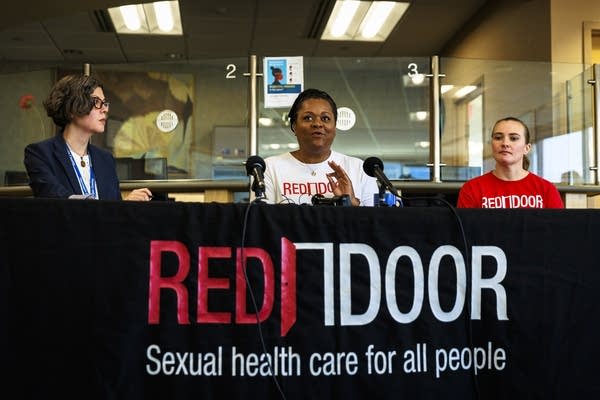Hennepin County clinic gives update on monkeypox outbreak in Minnesota

Go Deeper.
Create an account or log in to save stories.
Like this?
Thanks for liking this story! We have added it to a list of your favorite stories.
Minnesota health care providers on the front lines of the monkeypox outbreak say the risk remains low — but they want people to be aware, seek care and above all try to keep the virus from becoming endemic.
Staff at the Red Door Clinic, a Hennepin County public health clinic in downtown Minneapolis, identified the first case of monkeypox in the state back in June. With the case count now at 44 as of Thursday, they gave an update on what they're seeing.
"We're testing people every day for monkeypox. And so far, cases have not been severe. There have been no hospitalizations," said nurse practitioner Pam Layton.
Some takeaways from Thursday's update:
Turn Up Your Support
MPR News helps you turn down the noise and build shared understanding. Turn up your support for this public resource and keep trusted journalism accessible to all.
1) You're very, very unlikely to get monkeypox from going out shopping or being at community events.
"I'm not worried about your general risks from going to the grocery store or being in the community," said Bridget Daniels, another nurse practitioner at the Red Door Clinic. "We're not seeing it spread among people who aren't those close sexual contacts or household contacts. That's why we're talking about sexual risk. That's really where we're seeing it right now."

2) Don't think monkeypox is someone else's problem, and don't stigmatize the disease as a problem only for certain communities.
The Red Door Clinic practitioners said most of the cases they're seeing so far are among men who have sex with men.
But Layton said "it's important to know that anyone can get monkeypox." If you have prolonged contact with the virus, even unwittingly, you can get sick.
3) Monkeypox is painful and unpleasant, but so far, very unlikely to kill you.
"They always tend to show kind of the worst-case scenario, when someone is covered in lesions from head to toe. That's not what we're seeing in clinic," Layton said, adding that 20 lesions or so are more common, usually in areas covered by clothing.
"No one's been admitted to the hospital, and we've been able to keep in close contact with our patients and make sure that they're getting the things that they need," she said.

4) Vigilance and early treatment work
The health care providers say monkeypox starts with flu-like symptoms and progresses to weeks of skin lesions that sufferers describe as something like weapons-grade chickenpox. A pre-emergent fever is a tell-tale sign.
"The best way I can describe the lesions is they often start flat and then become raised up," Daniels said. "Almost like little Cheerios, little domed-up Cheerios with indented or darkened centers would be the most kind of common and unique appearance that I'm seeing with this, that doesn't look like other things I usually diagnose."
Vaccines and treatments can be effective — and potentially head off symptoms, if administered in time.
If you've got good reason to believe that you may have been exposed to monkeypox, Daniels says to NOT just wait to see what happens.
"If you can vaccinate someone within four days of an exposure, you can actually prevent illness, which is our goal. It's a tight window, but it can still prevent illness, or certainly reduce the severity of the illness," she said.
So far, though, vaccines are scarce, and that's one of the main ways Hennepin County is using the few doses they have.
5) Isolation is key to stopping the spread
As with COVID, isolation is a key tool in the epidemiological battle, to stop transmission. But as a skin ailment, monkeypox is a considerably more lengthy proposition, according to Angie Kotrba, a disease intervention specialist with Hennepin County Public Health.
"We're having to connect people to essential services because if you work somewhere and you're not able to work from home, then how how do you isolate for three to four weeks?" she said. "So we're connecting people with services through Hennepin County to make sure that they can access food, emergency assistance if needed, other resources and we can actually potentially get groceries delivered to someone if they need it."
She and the rest of the staff say they're busy, but happy to talk with anyone who needs help, whether they're in Hennepin County or not. More information is available online at reddoorclinic.org.


